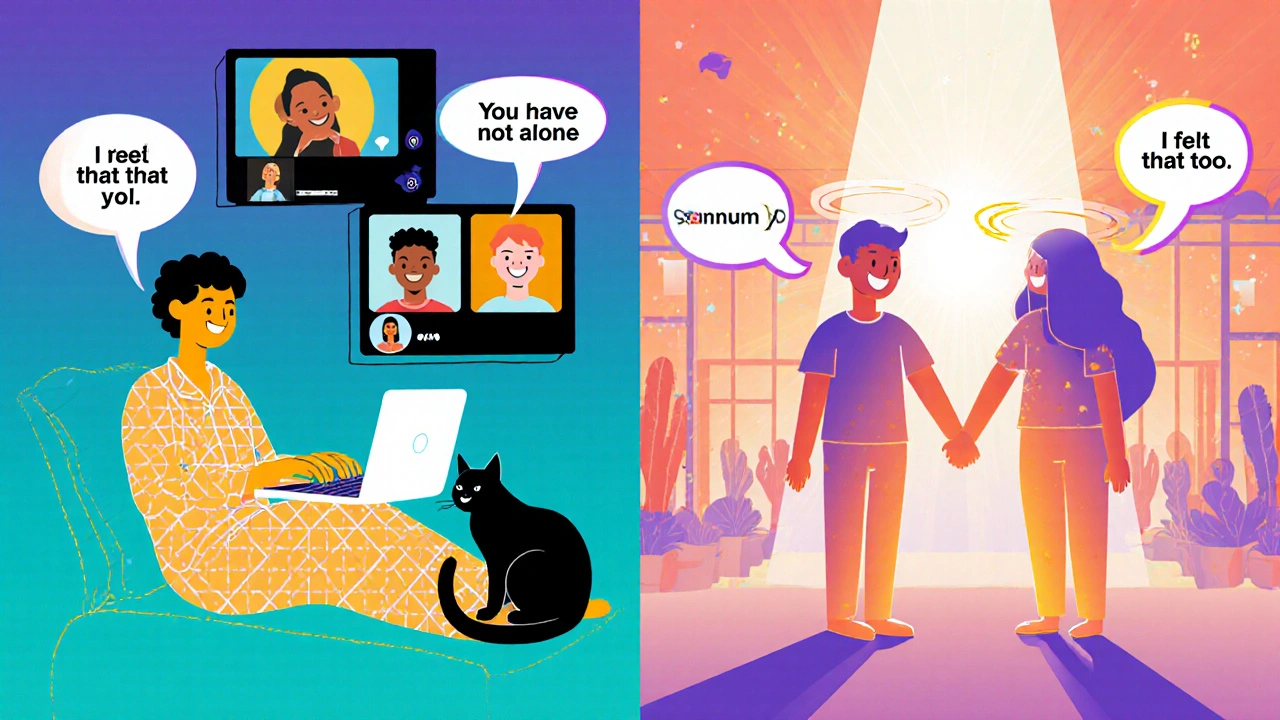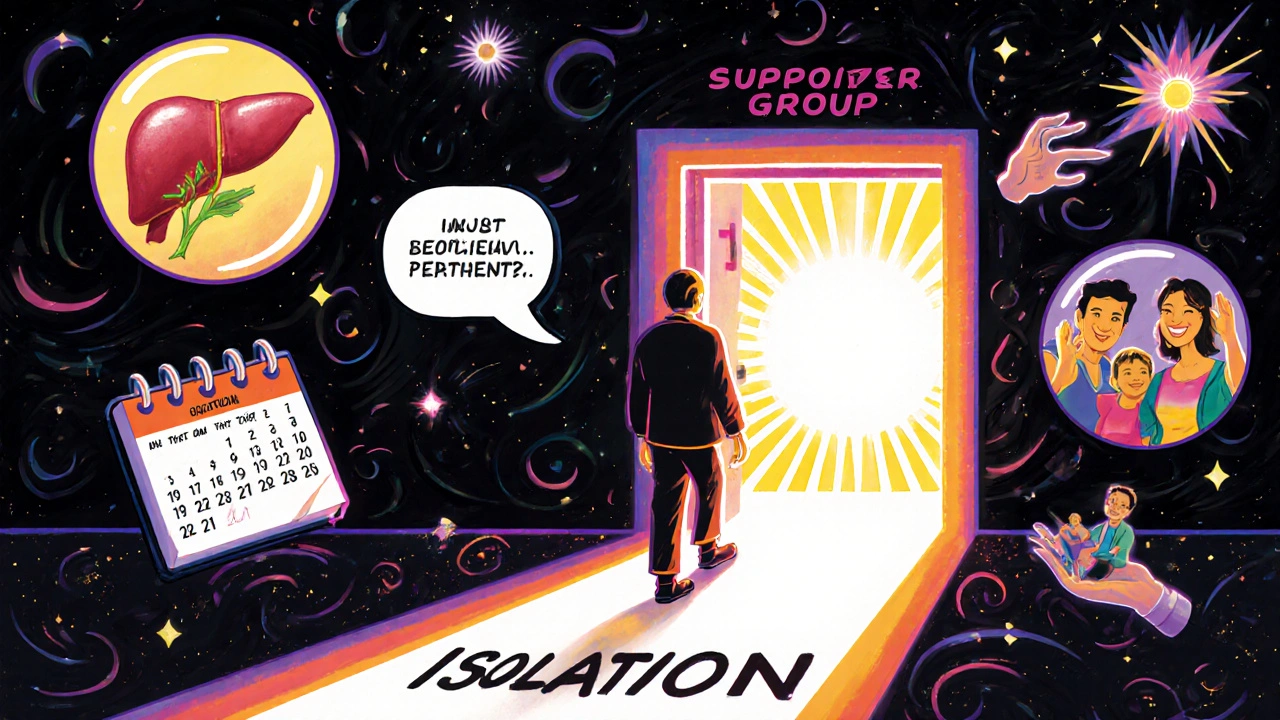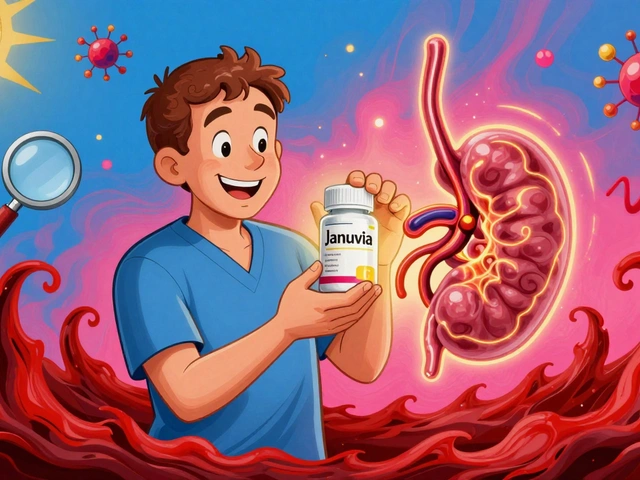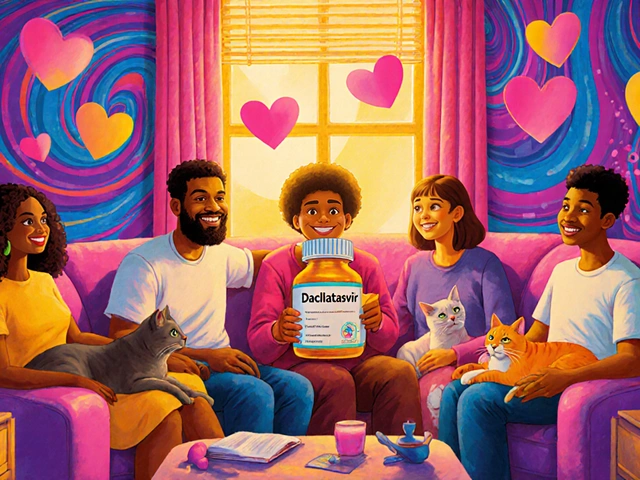When you’re taking daclatasvir for hepatitis C, the medicine does its job-but healing doesn’t stop at the pill bottle. Many people find that real progress comes from talking to others who’ve walked the same path. Support groups aren’t just about sharing stories. They’re where you learn what no doctor has time to tell you: how to handle fatigue without quitting your job, how to explain your diagnosis to your kids, or when to push back on a provider who doesn’t get it.
Why Support Groups Matter with Daclatasvir Treatment
Daclatasvir is a direct-acting antiviral that clears hepatitis C in most people within 12 weeks. Success rates are over 95% when used with sofosbuvir. But numbers don’t show the emotional weight. Side effects like headaches, nausea, or insomnia can feel isolating. You might worry about liver damage even after treatment ends. Or you might feel guilty for not being ‘better’ fast enough.
Support groups help by normalizing these feelings. A 2023 study from the American Association for the Study of Liver Diseases found that patients who joined peer-led groups were 40% more likely to stick with their full treatment course. That’s not because the medicine changed-it’s because they didn’t feel alone.
Where to Find Hepatitis C Support Groups
You don’t need to search far. Many trusted organizations run free, confidential groups-online and in-person.
- The Hepatitis C Trust offers weekly Zoom meetings with trained facilitators. No registration fee. You can join even if you’re still in treatment.
- Hepatitis Foundation International connects patients with local groups in over 30 states. Their website has a simple zip code finder.
- American Liver Foundation hosts monthly virtual forums. They also have a 24/7 helpline staffed by nurses who’ve treated hepatitis C patients for over a decade.
- Reddit’s r/hepatitisC has 45,000+ active members. It’s not moderated by professionals, but many users share real-time tips on managing daclatasvir side effects.
Some groups focus on specific needs. For example, there are groups just for veterans, women over 50, or people who contracted hepatitis C through drug use. You don’t have to fit a mold to belong.
What to Expect in Your First Meeting
Walking into your first group can feel scary. What if no one understands? What if you cry? What if you say the wrong thing?
Here’s what actually happens: People show up tired, nervous, and quiet. Then someone says, “I didn’t tell my boss I had hepatitis C for two years.” And suddenly, you realize-you’re not the only one.
Most groups follow a simple structure:
- Check-in: Everyone shares their name and one thing they’re feeling this week.
- Topic discussion: A moderator brings up a theme-like “How I handled work while on daclatasvir.”
- Open floor: Anyone can ask for advice or share a win.
- Wrap-up: One person shares a resource or a quote that helped them.
You don’t have to speak. Just listening counts. One woman told her group she only came to cry-and kept coming for two years because she finally felt heard.

Online vs. In-Person: Which Is Right for You?
Online groups win for convenience. You can join from your couch after work, in pajamas, with your cat on your lap. Great if you’re shy, live in a rural area, or have mobility issues.
In-person groups build deeper bonds. You see facial expressions. You feel the weight of a hand on your shoulder. You might walk out with a new friend who texts you when you’re having a rough day.
Try both. Many people start online, then join a local group after six months. There’s no rule. Do what feels safe.
How to Talk About Daclatasvir Without Feeling Stigmatized
Many patients avoid telling friends or coworkers because they fear judgment. But silence can be heavier than the disease.
Here’s a script that works for most people:
“I’m being treated for hepatitis C with a medication called daclatasvir. It’s a 12-week course, and it’s over 95% effective. I’m not contagious anymore after treatment. I just wanted you to know because I value our relationship, and I might need a little grace if I’m tired or quiet sometimes.”
That’s it. No oversharing. No begging for pity. Just clear, calm facts. Most people respond with kindness-not fear.
What Support Groups Won’t Tell You (But Should)
Support groups are powerful, but they’re not medical advice. Don’t use them to replace your doctor.
Some members might say, “I took this herb and my liver healed.” Or “My doctor said I didn’t need treatment-I waited five years.” That’s not evidence. That’s anecdote.
Good groups will say: “This worked for me, but talk to your provider before trying anything new.” If a group pushes supplements, detoxes, or miracle cures, leave. Daclatasvir is proven. Everything else is noise.
Also, not every group is welcoming. If someone makes you feel judged for your past, your income, or your treatment choices-that’s not support. That’s toxicity. Find another group.

How to Start Your Own Support Group
If there’s no group near you, start one. It’s easier than you think.
Step 1: Pick a platform. Zoom, Facebook, or even a local library meeting room.
Step 2: Contact a national organization like Hepatitis Foundation International. They’ll give you a free guide, talking points, and a list of local resources.
Step 3: Post on community boards, clinics, or social media: “Looking for others on daclatasvir. We meet every Thursday at 7 PM. No pressure to talk. Just be here.”
One man in rural Kansas started a group with just two people. Now it has 18 regular members. He didn’t need a degree. He just needed to show up.
What Happens After Treatment Ends?
Clearing the virus doesn’t mean everything goes back to normal. Many people still feel anxious. They worry about relapse. They miss the structure of treatment. Or they feel guilty for surviving when others didn’t.
Post-treatment support groups exist for this reason. They help you rebuild your identity-not as a patient, but as someone who beat hepatitis C. Some groups focus on nutrition, mental health, or reconnecting with family. Others just sit and talk about movies.
One woman told her group: “I used to think my liver was a ticking time bomb. Now I think of it as a quiet engine that just needed a tune-up.” That’s the kind of shift support groups help you make.
Final Thought: You’re Not Alone in This
Daclatasvir gives you a chance. Support groups give you the strength to use it.
You don’t have to be brave. You don’t have to be strong. You just have to show up. Even once. Even if you’re scared. Even if you cry. Even if you don’t say a word.
There’s someone out there who needs to hear your story. And you might need to hear theirs.
Can daclatasvir cure hepatitis C completely?
Yes. When taken as directed-usually with sofosbuvir-daclatasvir clears the hepatitis C virus in over 95% of patients after 12 weeks. A follow-up test 12 weeks after treatment ends confirms if the virus is gone. This is called a sustained virologic response, or SVR. Once you reach SVR, the virus is considered cured. You can’t pass it on anymore, and liver damage often improves over time.
Are hepatitis C support groups free?
Yes, most are completely free. Organizations like the American Liver Foundation, Hepatitis Foundation International, and The Hepatitis C Trust offer no-cost groups led by trained staff or peer volunteers. Some may ask for donations, but no one will turn you away for lack of funds. Online forums like Reddit’s r/hepatitisC are also free to join.
Can I join a support group while still on daclatasvir?
Absolutely. In fact, many people find the most value during treatment. Support groups help you manage side effects, stay on schedule, and cope with emotional stress. You don’t need to wait until you’re done to get help. Being in treatment is exactly when you need connection the most.
What if I feel judged in a support group?
You’re not alone in feeling that way. Some groups have people who’ve been through trauma, addiction, or stigma. If someone makes you feel bad about your choices, your background, or your treatment path, leave. A true support group doesn’t judge-it listens. You deserve a space where you’re accepted as you are. Try another group. There are many.
Do support groups replace medical care?
No. Support groups offer emotional and practical help, but they are not a substitute for medical care. Always follow your doctor’s instructions for daclatasvir, lab tests, and follow-ups. If someone in a group says to skip your meds or try an unproven remedy, ignore it. Your provider is your most important ally.
How do I find a group for veterans with hepatitis C?
The U.S. Department of Veterans Affairs offers hepatitis C support groups specifically for veterans. You can ask your VA provider for details, or visit the VA’s website and search for “hepatitis C peer support.” Many VA medical centers host weekly meetings, both in-person and virtual. Veterans who served during the 1970s-1990s have higher rates of hepatitis C, and these groups understand that history.








October 31, 2025 AT 02:33
Mamadou Seck
daclatasvir works but man the real win is finding people who get it without you having to explain why you cried in the grocery store over a can of soup
November 1, 2025 AT 18:15
Anthony Griek
just wanted to say i joined a VA group last year after treatment and it changed everything. no pressure to talk, no judgment. just people who know what it means to carry this silently for years. you don't need to be fixed to belong here
November 2, 2025 AT 01:02
Norman Rexford
look i get it but why are we giving free groups to everyone when half the people in these threads are still on meth and blaming the government for their cirrhosis? daclatasvir cures the virus not your life choices bro
November 2, 2025 AT 21:54
Wayne Keller
if you're on daclatasvir and feeling alone just remember you're not. i was in the same spot 18 months ago. tired all the time. scared to tell anyone. then i found a zoom group and didn't say a word for three weeks. just listened. now i run one. it's not about being brave. it's about showing up. even once.
November 4, 2025 AT 11:06
Shana Labed
OMG YES I FOUND MY PEOPLE ON REDDIT!!! I WAS SO SCARED TO TALK BUT THEN SOMEONE SAID THEY ATE AVOCADOS EVERY DAY TO FIGHT FATIGUE AND I WAS LIKE WOW I'M NOT CRAZY!!! THIS IS THE BEST THING THAT HAS HAPPENED TO ME SINCE I FINISHED TREATMENT!!!
November 5, 2025 AT 00:27
California Daughter
...but...have you considered that maybe the real issue isn't the virus...but the medical-industrial complex that profits from your fear? I mean...why do we even need support groups? shouldn't the system just...work? also...have you tried magnesium? and...have you heard of the new study from Sweden? I think we're being manipulated...
November 5, 2025 AT 20:56
Vishwajeet Gade
usa has 1000000000000 support groups but in india we just take neem leaves and pray. your system is broken. why not fix the root cause instead of giving pep talks?
November 7, 2025 AT 00:49
Casey Crowell
just joined my first group yesterday. cried for 20 mins. didn't say a word. someone handed me a tissue and said 'welcome home'. 🥹 i'm not okay...but i'm not alone anymore. thank you to whoever wrote this post. you saved me.
November 7, 2025 AT 22:36
Shanna Talley
you don't have to be strong. you don't have to be brave. you just have to be here. that's enough. i still come to the group even though i'm cured. not because i need to. because someone else might need to hear that it gets better. and sometimes...i need to hear it too.
November 8, 2025 AT 09:44
Gina Damiano
i'm sorry but i have to say this...i saw someone in my group say they were using CBD oil to 'cleanse their liver' and now i'm worried they'll stop their meds. you can't just replace science with vibes. this is dangerous. someone needs to step in and say something before someone gets hurt.
November 10, 2025 AT 03:03
Emily Duke
ok but...why do we keep pretending these groups are 'safe'? i went to one and someone asked if i was 'a junkie' and then told me i deserved hepatitis C because i used needles in my 20s. i left crying. no one defended me. so...what's the point? these groups are just echo chambers for guilt trips.